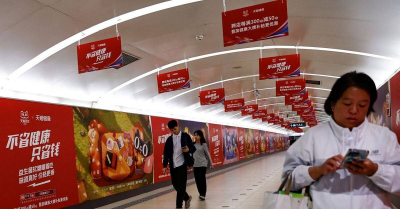Reuters-Explainer What is Chinas Singles Day and how is it celebrated
November 10, 2023 4 min 841 words
这篇报道深刻解析了中国独有的购物狂欢盛事——光棍节。作者生动地介绍了其起源、发展历程和庞大的销售规模。值得关注的是,去年的销售额高达1.15万亿元,远超美国网络购物周的353亿美元。然而,尽管总销售额创下新高,光棍节的增长速度逐年减缓,去年仅为3%。这或许反映出光棍节在其他购物节兴起的背景下逐渐失去新奇感。报道还指出,全球知名品牌如耐克、雅诗兰黛等都积极参与,但今年一些公司对于在中国光棍节的支出表现出谨慎态度。这或许预示着光棍节可能在未来面临更多的竞争和变革。在疫情好转和经济复苏的背景下,对于光棍节销售的乐观态度,也为中国的消费市场带来一线希望。
Black Friday? No. Cyber Monday? Nope. Prime Day? Absolutely not. The world's biggest shopping event happens in China each year - and it's called Singles Day.
Originally a holiday to celebrate being single, as a counter to Valentine's Day, the event has grown into a weeks-long online shopping festival that peaks on Nov. 11.
The idea for Singles Day had originated at China's Nanjing University back in 1993 and was originally called "Bachelor's Day." On the day, single people treat themselves with gifts and presents, while also organizing social gatherings and parties.
Last year, the total value of goods sold during the shopping bonanza - also known as "Double 11" - totaled 1.15 trillion yuan ($157.97 billion), according to data from consultancy firm Bain.
That is more than four times the $35.3 billion U.S. shoppers spent last year during Cyber Week, the period from Black Friday to Cyber Monday, per data from Adobe Analytics.
Cyber Monday immediately follows Black Friday, which falls on the day after the U.S. Thanksgiving Day holiday, the busiest shopping day of the year in the United States.
But growth has been slowing even as overall sales for Singles Day hit record highs, with last year's 3% rise marking the slowest increase ever. The event has in recent years lost some of its novelty with the rise of other shopping festivals in China, including the midyear "618" sales that are the country's second largest.
Strict COVID-19 curbs in China impacted sales last year, but several industry experts are expecting a rebound, as the economy improves and livestream sales remain robust.
"We're optimistic about growth this year because the recovery seems to be stabilizing and consumption is on a more clear upward trend," said Jacob Cooke, co-founder and CEO of Beijing-based WPIC Marketing + Technologies.
His e-commerce consultancy firm expects sales for the Chinese shopping event to rise in the range between 14% and 18% from last year, which is higher than Adobe's projection for a 5.4% rise in Cyber Week sales.
While Alibaba 9988.HK started "Double 11" in 2009 to win over online shoppers with discounts and promotions, China's major e-commerce platforms now all take part in it.
JD.com (9618.HK) joined in 2012 and PDD Holdings-owned (PDD.O) Pinduoduo has also become a significant player, offering low cost products in competition with Alibaba-owned Tmall and Taobao platforms.
Last year, Chinese shoppers spent more on essentials, supplements, vitamins and pet-care products. Those products are expected to stay in demand this year, along with more lifestyle-focused products such as athletic wear and sports equipment.
"There is enormous demand among Chinese consumers for products and services that improve their lifestyles and facilitate self-expression," Cooke said.
In comparison, U.S. shoppers last year had bought more Pokemon toys, Hot Wheels, TVs, footwear and air fryers during the key Black Friday and Cyber Monday shopping periods, according to Adobe.
From 2014 until 2021, Singles Day had posted growth rates of about 34% annually on average, versus Cyber Week's 17% average gain, according to data from consultancy Bain and from Adobe Analytics.
Several American companies from apparel makers Nike (NKE.N) and Lululemon (LULU.O) to cosmetics firm Estee Lauder (EL.N) and consumer goods giant Procter & Gamble (PG.N) have a big presence on the Tmall marketplace and stand to benefit from the event.
Last year, Apple (AAPL.O), Nike and L'Oreal (OREP.PA) were also among the biggest winners from the event, along with Chinese home appliance makers such as Haier and Midea and sportswear brand Anta.
Nike said in December "Double 11" demand in Greater China grew by mid-teens, outpacing the broader sports industry, with demand from Gen Z consumers for the brand growing by 45% during the shopping period in China on Tmall.
JD.com had noted Apple sold more than 1 billion yuan worth of products in the first minute of the event's final sales period.
However, for this year, several global companies ranging from L'Oreal to Estee Lauder have taken a cautious stance around the spending spree in China during the shopping event.
"The presale period of Tmall and particularly on -- in general, the Singles Day, confirms a softer trend versus a year ago," said Estee Lauder CEO Fabrizio Freda last week, adding that the company was more optimistic about the next part of the Singles Day events in November.
L'Oreal CEO Nicolas Hieronimus on a post earnings call with analysts in October said it was too soon to comment on "Double 11."
"The shy consumers are less shy during the big events, and we have seen that whether it's during Valentine's Day, whether it is 6/18, the market has had its best peaks of growth during this moment," Hieronimus said, adding he had lots of hope for the shopping bonanza.
($1 = 7.2800 Chinese yuan renminbi)

